The Samsung SSD 850 EVO mSATA/M.2 Review
by Kristian Vättö on March 31, 2015 10:00 AM ESTRandom Read Performance
One of the major changes in our 2015 test suite is the synthetic Iometer tests we run. In the past we used to test just one or two queue depths, but real world workloads always contain a mix of different queue depths as shown by our Storage Bench traces. To get the full scope in performance, I'm now testing various queue depths starting from one and going all the way to up to 32. I'm not testing every single queue depth, but merely how the throughput scales with the queue depth. I'm using exponential scaling, meaning that the tested queue depths increase in powers of two (i.e. 1, 2, 4, 8...).
Read tests are conducted on a full drive because that is the only way to ensure that the results are valid (testing with an empty drive can substantially inflate the results and in reality the data you are reading is always valid rather than full of zeros). Each queue depth is tested for three minutes and there is no idle time between the tests.
I'm also reporting two metrics now. For the bar graph, I've taken the average of QD1, QD2 and QD4 data rates, which are the most relevant queue depths for client workloads. This allows for easy and quick comparison between drives. In addition to the bar graph, I'm including a line graph, which shows the performance scaling across all queue depths. To keep the line graphs readable, each drive has its own graph, which can be selected from the drop-down menu.
I'm also plotting power for SATA drives and will be doing the same for PCIe drives as soon as I have the system set up properly. Our datalogging multimeter logs power consumption every second, so I report the average for every queue depth to see how the power scales with the queue depth and performance.
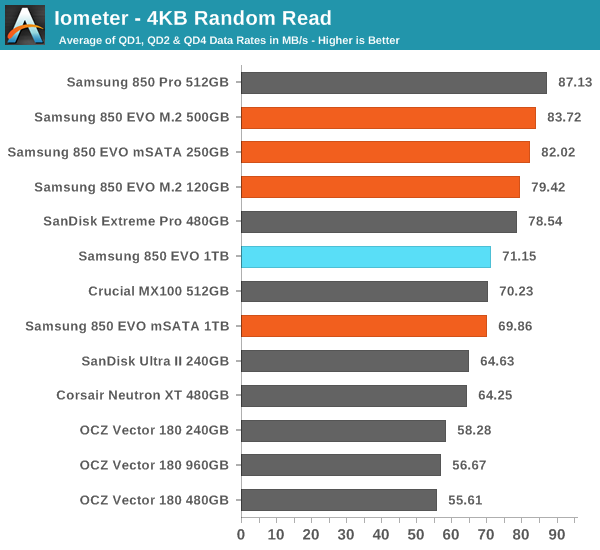
Random read performance has always been Samsung's strength and particularly the 500GB and smaller capacities do well thanks to the faster MGX controller.
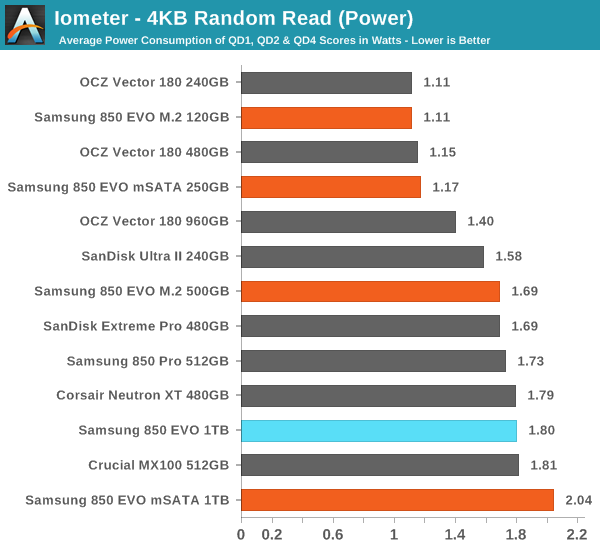
Power consumption is also good, although the 1TB model sips quite a bit of power.
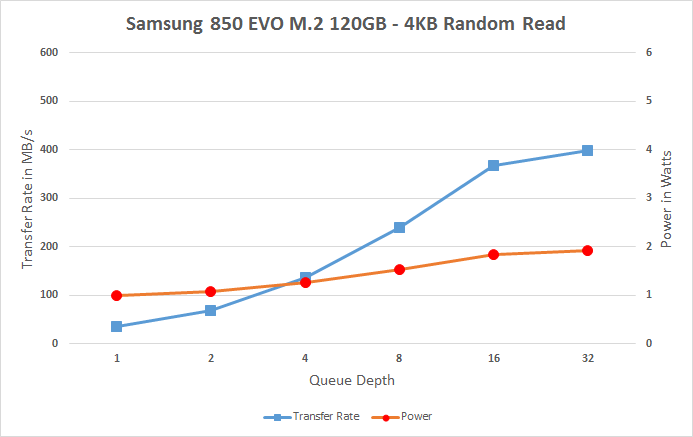 |
|||||||||
The performance scales nicely with the queue depth too.
Random Write Performance
Write performance is tested in the same way as read performance, except that the drive is in a secure erased state and the LBA span is limited to 16GB. We already test performance consistency separately, so a secure erased drive and limited LBA span ensures that the results here represent peak performance rather than sustained performance.
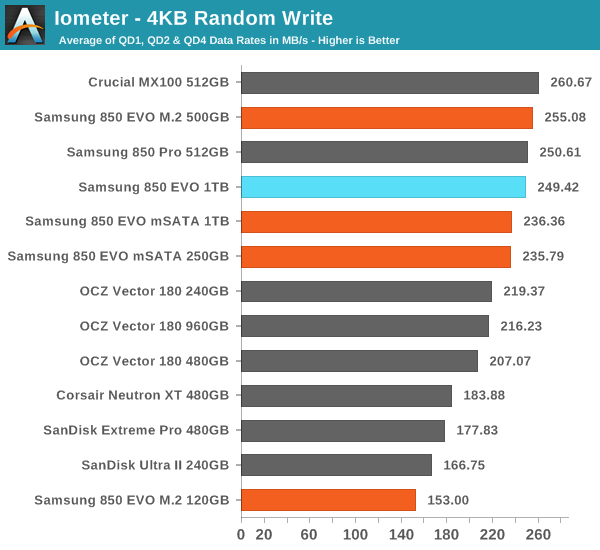
Random write performance is equally strong, which is mostly thanks to TurboWrite.
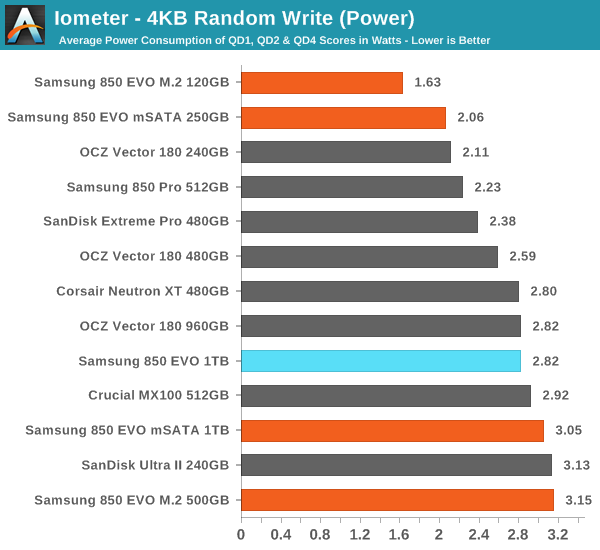
Power consumption is decent as well, and while the larger capacities are more power hungry the difference to competing drives isn't substantial.
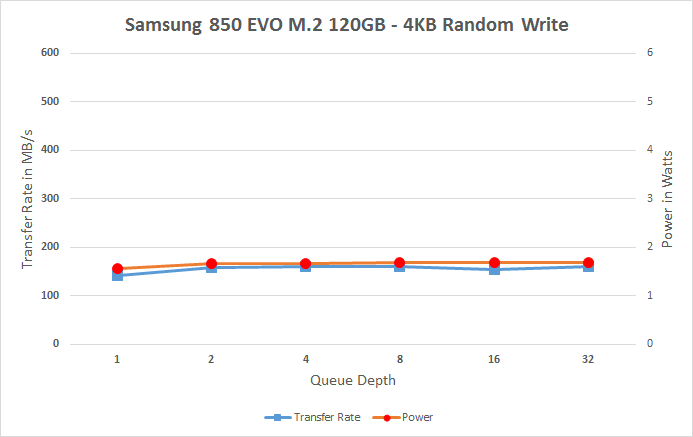 |
|||||||||
Since the 120GB SKU has less parallelism due to having less NAND, its performance doesn't scale at all with the queue depth (QD1 is already saturating the available NAND bandwidth), but the other models scale pretty nicely. You do see a slight drop in performance after the TurboWrite buffer has been filled, but in client workloads it's unlikely that you will be filling the buffer at once like our tests do.










58 Comments
View All Comments
Laststop311 - Wednesday, April 1, 2015 - link
Was really disappointed with the 1TB results. Also disappointed no ultra m2 interface. I wont be upgrading until I can get a pci-e 3.0 x4 interface on the drive. The samsung sm951 is where its at.Laststop311 - Wednesday, April 1, 2015 - link
Really annoying that I dont see this drive for sale anywhere and it's been talked about for a loooong timeKristian Vättö - Wednesday, April 1, 2015 - link
RamCity just got its first SM951 batch, so it's now available for purchase.https://www.ramcity.com.au/upgrade/data-storage/in...
bricko - Thursday, April 2, 2015 - link
Is the 951 NVMe - How to they compare to the new Intel 750 series which are PCIe gen 3 and NVMeseen here
http://linustechtips.com/main/topic/340041-intel-l...
http://forums.overclockers.co.uk/showthread.php?p=...
Intel are launching the new 750 Series range of SSD's these are PCI-E 3.0 versions with 4 lanes and are NVMe based SSD's
goodyes - Wednesday, April 1, 2015 - link
Ya, but results that I have a 1TB 840 msata and write sequential at more than 500MBps around 520max MBps, and now I see than new 850 msata tops at ?? 480MBps ?? cannot be possible what my eyes look, AND WHY THE HELL NO ONE REVIEWER COMPARE With olders 840 msata, so I must think that all of you guys are a paid reviewers and you get money from samsung, if not, YOU MUST compare to older modelKenPC - Wednesday, April 1, 2015 - link
I am seriously concerned that the 840 evo, and TLC in general may indeed have an uncurable problem with slowdown after a period of time. This same problem has also been reported in multiple instances for Samsung OEM drives based on the 840 evo TLC technology.GIven that the 850 evo msata line was delayed by Samsung by about a month, it might be possible that the Anandtech review units were actually tested in late Feb and the go-ahead to publish the results only recently provided.
I did also notice that the estimated 'March" timeframe for a new 840 evo firmware has come and passed, as well as no drive magician support for the 850 evo m2/msata drives yet.
Anandtech results for the 1TB 850 evo unit are also quite concerning.
So, I also join the crowd asking for a look at the 850 evo 2.5 and msata drives after some time has passed to see if they suffer from the slowdown problem too.
And a rhetorical, but serious question - does anybody actually have a Samsung TLC drive that has NOT suffered from the slowdown as measured by the proper tools a few months after the drive was formatted/set up?
And kudos to Anandtech - for an SSD review that really tests the drives, not just a run of ATTO or such.
Per Hansson - Wednesday, April 1, 2015 - link
"anything that taxes the drive a bit more may run into the issue, which is basically that the drive stops for up to dozens of seconds (i.e. your system freezes). Until Samsung fixes that, I would advise against buying the 1TB version unless you have a very light workload (web browsing, email, etc.). I suspect it's fixable through a firmware update, but I'll have to wait for Samsung's reply to be sure of that."A wise man once said: if you wait for a firmware fix for your Samsung SSD's you will wait a long time.
He died of old age.
RIP Samsung 840 TLC drives.
Dzungpv - Friday, April 3, 2015 - link
Missing Temperature when idle, full load or stretch, i want this information before buy them .szhosain - Sunday, April 5, 2015 - link
As far as I can tell, you only tested the M.2 version of the Samsung 850 EVO in a 500GB size.Can we assume that the MSATA version of that drive and size will perform essentially identically?
voicequal - Monday, April 13, 2015 - link
Good catch on the poor mSATA 1TB performance during the performance consistency test. It harkens back to the early Jmicron stuttering days. I was similarly affected by the SanDisk U100 a few years ago. The system freezes, particularly when swap file is active, and disk throughput drops to low single digit MB/s. Hard to believe the most modern SSDs can still get into this state. Vanilla benchmarks don't show the problem.